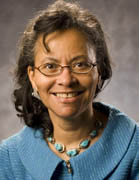NHSA is excited to announce Dr. Gail Christopher will be kicking off our 2015 Annual Spring Conference on Sunday, March 1, 2015!
Dr. Gail Christopher, DN, is vice president for policy and senior advisor at the W.K. Kellogg Foundation in Battle Creek, Michigan.
at the W.K. Kellogg Foundation in Battle Creek, Michigan.
In this role, she serves on the president’s cabinet that provides overall direction and leadership for the foundation. Since joining the foundation in 2007, Gail has served as vice president for program strategy with responsibility for multiple areas of programming, including Racial Equity; Food, Health & Well-Being; Community Engagement and Leadership; as well as place-based programming in New Orleans and New Mexico.
Gail is a nationally recognized leader in health policy, with particular expertise and experience in the issues related to social determinants of health, health inequities and public policy issues of concern to our nation’s future. Gail has more than 20 years of experience in designing and managing national initiatives and nonprofit organizations. She brings extensive knowledge and experience in creating a comprehensive approach to well-being and is nationally recognized for her pioneering work to infuse holistic health and diversity concepts into public sector programs and policy discourse. Her distinguished career and contributions to public service were honored in 1996 when she was elected as a fellow of the National Academy of Public Administration. In 2007 she received the Leadership Award from the Health Brain Trust of the Congressional Black Caucus for her work in reducing racial and ethnic health disparities; in 2009 she was named a Society for Public Health Education (SOPHE) Honorary Fellow – the highest recognition given to a non-SOPHE member, who has made significant contributions to health education and to public health; in 2011 she was awarded the “Change Agent Award” by the Schott Foundation for Public Education; in 2012 she was the recipient of the Association of Maternal & Child Health Programs (AMCHP) John C. MacQueen Lecture Award for her innovation and leadership in the field of maternal and child health.
A prolific writer and presenter, Gail is the author or co-author of three books, a monthly column in the Federal Times, and more than 250 articles, presentations and publications. Her national print and broadcast media credits are numerous, and include The Washington Post, Los Angeles Times, Dallas, Times, National Journal, Essence, “Good Morning America,” “The Oprah Winfrey Show,” National Public Radio and documentaries on PBS and CBS.
Prior to joining the foundation, Gail was vice president of the Joint Center for Political and Economic Studies’ Office of Health, Women and Families in Washington, D.C. There, she led the Joint Center Health Policy Institute, a multi-year initiative created to engage underserved, racial and ethnic minorities in health policy discussions. Previously, she was guest scholar in the governance studies department at The Brookings Institution in Washington, D.C. and executive director of the Institute for Government Innovation at Harvard’s John F. Kennedy School of Government in Cambridge, Massachusetts. She has additional experience at the National Academy of Public Administration, Howard University School of Divinity, Americans All National Education Program and Family Resource Coalition of America. She has also launched, led and managed three public commissions. Under her sponsorship, the landmark Dellums Commission research into conditions faced by young men of color produced policy recommendations to reduce racial and ethnic health disparities.
Gail holds a doctor of naprapathy degree from the Chicago National College of Naprapathy in Illinois and completed advanced study in the interdisciplinary Ph.D. program in holistic health and clinical nutrition at the Union for Experimenting Colleges and Universities at Union Graduate School of Cincinnati, Ohio. She is president of the Board of Directors of the Trust for America’s Health.
The W.K. Kellogg Foundation (WKKF), founded in 1930 as an independent, private foundation by breakfast cereal pioneer, Will Keith Kellogg, is among the largest philanthropic foundations in the United States. Guided by the belief that all children should have an equal opportunity to thrive, WKKF works with communities to create conditions for vulnerable children so they can realize their full potential in school, work and life.
The Kellogg Foundation is based in Battle Creek, Michigan, and works throughout the United States and internationally, as well as with sovereign tribes. Special emphasis is paid to priority places where there are high concentrations of poverty and where children face significant barriers to success. WKKF priority places in the U.S. are in Michigan, Mississippi, New Mexico and New Orleans; and internationally, are in Mexico and Haiti. For more information, visit www.wkkf.org.
To see more of the speaker line-up and register for the Spring Conference, visit the National Healthy Start Association website.
 2016 intern for the National Healthy Start Association. Studying Public Health and Human Services, I have a great interest in improving community improvement initiatives that result in an increased quality of life and health for residents. My interest not only led me to enter in Public Health Studies but also created a direct path to the National Healthy Start Association (NHSA). Through community-based programs, NHSA aids mothers, fathers, and families in taking control of their health. Through advocacy, teaching, training, and lots of TLC, NHSA provides families with the tools needed be a voice for themselves and a voice for their communities.
2016 intern for the National Healthy Start Association. Studying Public Health and Human Services, I have a great interest in improving community improvement initiatives that result in an increased quality of life and health for residents. My interest not only led me to enter in Public Health Studies but also created a direct path to the National Healthy Start Association (NHSA). Through community-based programs, NHSA aids mothers, fathers, and families in taking control of their health. Through advocacy, teaching, training, and lots of TLC, NHSA provides families with the tools needed be a voice for themselves and a voice for their communities.




